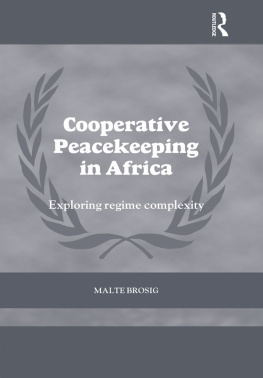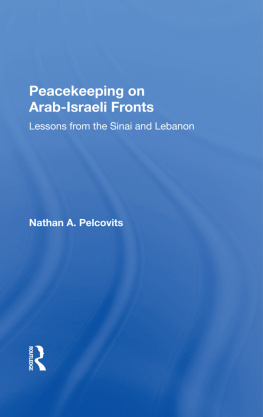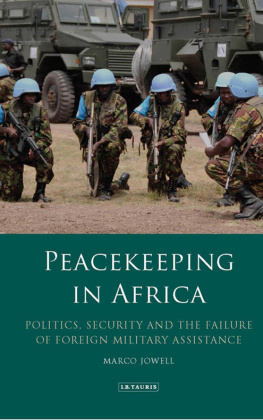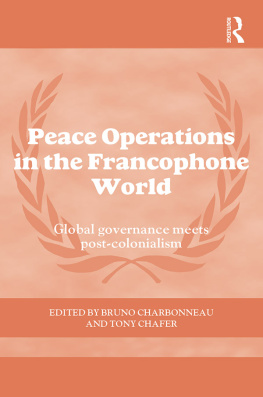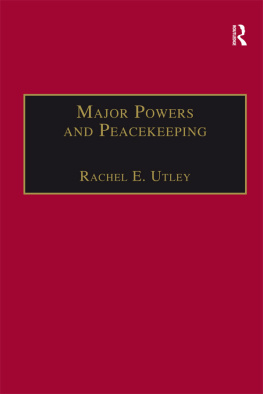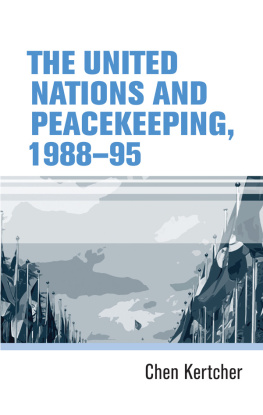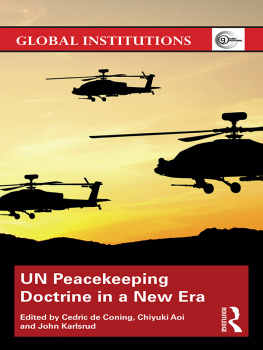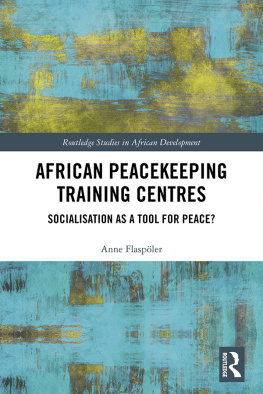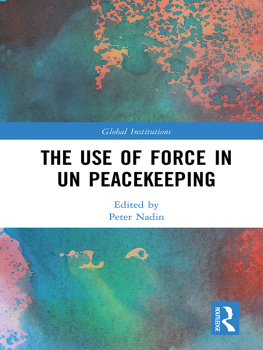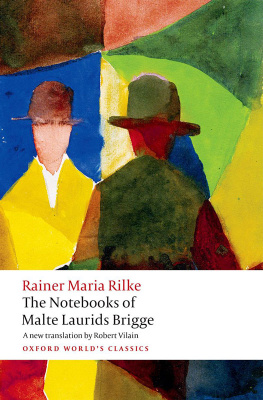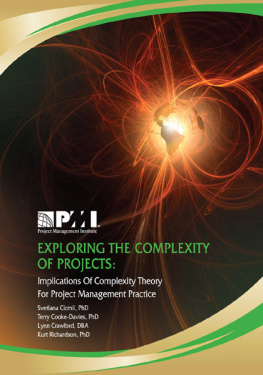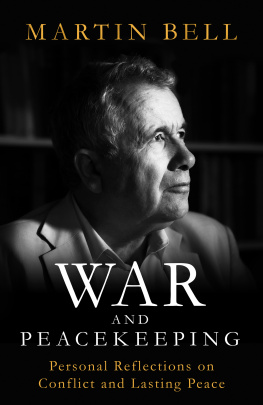Cooperative Peacekeeping in Africa
This book examines peacekeeping in Africa, exploring how the various actors are forming an African security regime complex.
The changing dynamics of peacekeeping in todays world have encouraged a more cooperative approach between international and regional actors. At the centre of this book is the analysis of how an African security regime complex could emerge in the area of cooperative peacekeeping. The African regime complex on peacekeeping includes a number of organ-isations at the regional and sub-regional African level, as well as global institutions such as the UN, interregional partners such as the EU and individual lead nations. This book is the first in providing a systematic overview of peacekeeping doctrines, capacities and deployments of these key actors and single lead states. Theoretically, the book links up with regime complexity scholarship but connects it with dependency theory. Here inter-institutional relations are conceptualised as acts of resource exchange. The book explores how primarily international organisations are partnering by exchanging resources. Empirically, the study analyses the phenomenon of regime complexity in three prominent African crises covering Eastern Africa (Somalia), Central Africa (Central African Republic) and Western Africa (Mali).
This book will be of much interest to students of peacekeeping, international organisations, African politics, security studies and IR in general.
Malte Brosig is Associate Professor in International Relations at the Department of International Relations at the University of Witwatersrand, Johannesburg, South Africa.
Cass Series on Peacekeeping
General Editor: Michael Pugh
This series examines all aspects of peacekeeping, from the political, operational and legal dimensions to the developmental and humanitarian issues that must be dealt with by all those involved with peacekeeping in the world today.
Beyond the Emergency
Development within UN peace missions
Edited by Jeremy Ginifer
The UN, Peace and Force
Edited by Michael Pugh
Mediating in Cyprus
The Cypriot communities and the United Nations
Oliver P. Richmond
Peacekeeping and the UN Agencies
Edited by Jim Whitman
Peacekeeping and Public Information
Caught in the crossfire
Ingrid A. Lehmann
The Evolution of US Peacekeeping Policy under Clinton
A fairweather friend?
Michael G. MacKinnon
Peacebuilding and Police Reform
Edited by Tor Tanke Holm and Espen Barth Eide
Peacekeeping and Conflict Resolution
Edited by Tom Woodhouse and Oliver Ramsbotham
Managing Armed Conflicts in the 21st Century
Edited by Adekeye Adebajo and Chandra Lekha Sriram
Women and International Peacekeeping
Edited by Louise Olsson and Torunn L. Tryggestad
Recovering from Civil Conflict
Reconciliation, peace and development
Edited by Edward Newman and Albrecht Schnabel
Mitigating Conflict
The role of NGOs
Edited by Henry F. Carey and Oliver P. Richmond
Ireland and International Peacekeeping 19602000
A study of Irish motivation
Katsumi Ishizuka
Peace Operations after 11 September 2001
Edited by Thierry Tardy
Confronting Past Human Rights Violations
Justice vs peace in times of transition
Chandra Lekha Sriram
The National Politics of Peacekeeping in the Post-Cold War Era
Edited by David S. Sorensen and Pia Christina Wood
A UN Legion
Between utopia and reality
Stephen Kinloch-Pichat
United Nations Peacekeeping in the Post-Cold War Era
John Terence ONeill and Nicholas Rees
The Military and Negotiation
The role of the soldierdiplomat
Deborah Goodwin
NATO and Peace Support Operations 19911999
Policies and doctrines
Henning-A. Frantzen
International Sanctions
Between words and wars in the global system
Edited by Peter Wallensteen and Carina Staibano
Nordic Approaches to Peace Operations
A new model in the making?
Peter Viggo Jakobsen
Kosovo between War and Peace
Nationalism, peacebuilding and international trusteeship
Edited by Tonny Brems Knudsen and Carsten Bagge Laustsen
Clinton, Peacekeeping and Humanitarian Interventionism
Rise and fall of a policy
Leonie G. Murray
Political Ethics and the United Nations
Dag Hammarskjld as Secretary-General
Manuel Frhlich
Statebuilding and Justice Reform
Post-conflict reconstruction in Afghanistan
Matteo Tondini
Rethinking the Liberal Peace
External models and local alternatives
Edited by Shahrbanou Tadjbakhsh
Peace Operations and Organized Crime
Enemies or allies?
Edited by James Cockayne and Adam Lupel
Corruption and Post-Conflict Peacebuilding
Selling the peace?
Edited by Christine Cheng and Dominik Zaum
South America and Peace Operations
Coming of age
Edited by Kai Michael Kenkel
Peace Operations in the Francophone World
Global governance meets post-colonialism
Edited by Bruno Charbonneau and Tony Chafer
Cooperative Peacekeeping in Africa
Exploring regime complexity
Malte Brosig
In Africa, partnership peacekeeping has become the norm. But how do the complex set of contemporary inter-institutional relationships really work? Malte Brosigs book offers a useful conceptual framework for explaining how peacekeeping works by focusing on the different ways in which resources are transferred across and within international institutions. Case study chapters focused on key theatres (Somalia, Mali, and CAR) and key bilateral actors (Nigeria, South Africa, France, UK, US, and China) usefully illustrate the complex interdependence shaping international responses to Africas recent war zones.
Paul D. Williams, George Washington University, USA
Malte Brosigs Cooperative Peacekeeping in Africa offers one of the few analyses that is grounded in broader conceptual debates about inter-organizational capacities and cooperation. Equally significant, it provides a comparative perspective of peacekeeping experiences in some of the core crises of the last decades. It fills a major gap in the literature on peacekeeping in Africa.
Gilbert M. Khadiagala, University of the Witwatersrand, South Africa
Contemporary peace operations in Africa are characterised by complex and highly interdependent multiparty relationships. In this book Malte Brosig analyses the emergence of cooperative peacekeeping in Somalia, the Central African Republic and Mali. This book is an important contribution to our understanding of peacekeeping, cooperation and international organisations.
Cedric de Coning, Norwegian Institute of
International Affairs (NUPI), Norway

